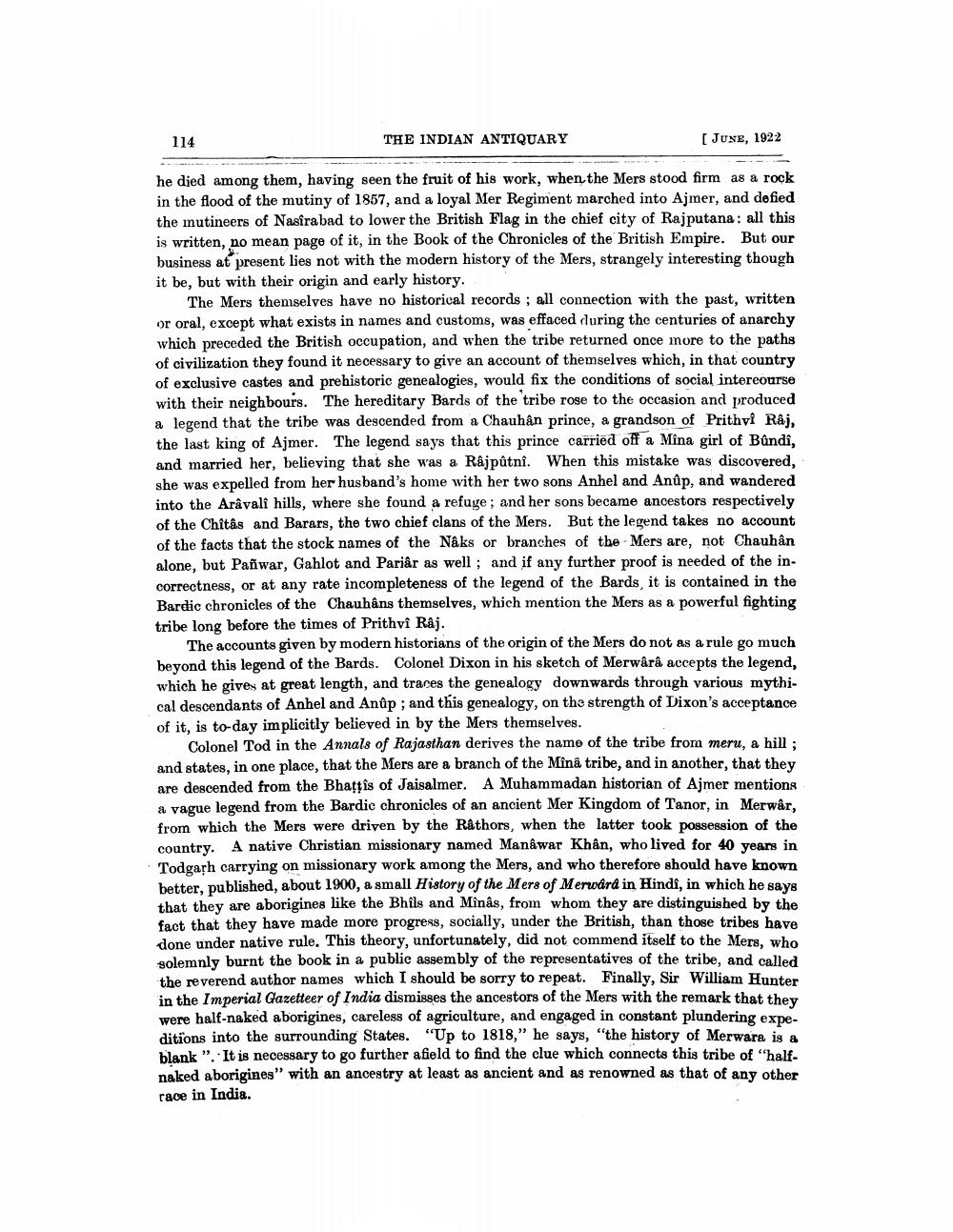________________
114
THE INDIAN ANTIQUARY
(JUNE, 1922
he died among them, having seen the fruit of his work, when the Mers stood firm as a rock in the flood of the mutiny of 1857, and a loyal Mer Regiment marched into Ajmer, and defied the mutineers of Nasirabad to lower the British Flag in the chief city of Rajputana: all this is written, no mean page of it, in the Book of the Chronicles of the British Empire. But our business at present lies not with the modern history of the Mers, strangely interesting though it be, but with their origin and early history.
The Mers themselves have no historical records ; all connection with the past, written or oral, except what exists in names and customs, was effaced during the centuries of anarchy which preceded the British occupation, and when the tribe returned once more to the paths of civilization they found it necessary to give an account of themselves which, in that country of exclusive castes and prehistoric genealogies, would fix the conditions of social intereourse with their neighbours. The hereditary Bards of the tribe rose to the occasion and produced a legend that the tribe was descended from a Chauhan prince, a grandson of Prithvi Raj, the last king of Ajmer. The legend says that this prince carried off a Mina girl of Bûndi, and married her, believing that she was a Râjpûtni. When this mistake was discovered, she was expelled from her husband's home with her two sons Anhel and Anûp, and wandered into the Arâvali hills, where she found a refuge; and her sons became ancestors respectively of the Chitâs and Barars, the two chief clans of the Mers. But the legend takes no account of the facts that the stock names of the Nâks or branches of the Mers are, not Chauhan alone, but Panwar, Gahlot and Pariâr as well, and if any further proof is needed of the incorrectness, or at any rate incompleteness of the legend of the Bards, it is contained in the Bardic chronicles of the Chauhậns themselves, which mention the Mers as a powerful fighting tribe long before the times of Prithvi Raj.
The accounts given by modern historians of the origin of the Mers do not as a rule go much beyond this legend of the Bards. Colonel Dixon in his sketch of Merwârâ accepts the legend, which he gives at great length, and traces the genealogy downwards through various mythical descendants of Anhel and Anûp; and this genealogy, on the strength of Dixon's acceptance of it, is to-day implicitly believed in by the Mers themselves.
Colonel Tod in the Annals of Rajasthan derives the name of the tribe from meru, a hill; and states, in one place, that the Mers are a branch of the Minâ tribe, and in another, that they are descended from the Bhattis of Jaisalmer. A Muhammadan historian of Ajmer mentions a vague legend from the Bardic chronicles of an ancient Mer Kingdom of Tanor, in Merwâr, from which the Mers were driven by the Rathors, when the latter took possession of the country. A native Christian missionary named Manawar Khan, who lived for 40 years in Todgash carrying on missionary work among the Mers, and who therefore should have known better, published, about 1900, a small History of the Mers of Merward in Hindi, in which he says that they are aborigines like the Bhils and Minâs, from whom they are distinguished by the fact that they have made more progress, socially, under the British, than those tribes have done under native rule. This theory, unfortunately, did not commend itself to the Mers, who solemnly burnt the book in a public assembly of the representatives of the tribe, and called the reverend author names which I should be sorry to repeat. Finally, Sir William Hunter in the Imperial Gazetteer of India dismisses the ancestors of the Mers with the remark that they were half-naked aborigines, careless of agriculture, and engaged in constant plundering expeditions into the surrounding States. "Up to 1818," he says, "the history of Merwara is a blank". It is necessary to go further afield to find the clue which connects this tribe of "halfnaked aborigines" with an ancestry at least as ancient and as renowned as that of any other race in India.




